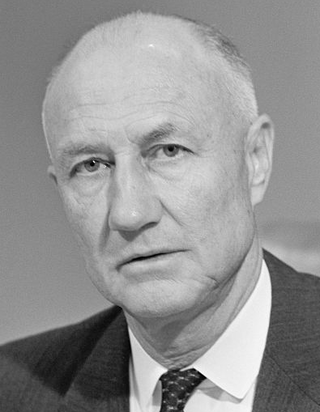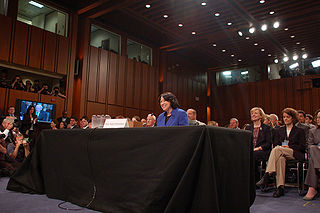Related Research Articles

An associate justice of the Supreme Court of the United States is a justice of the Supreme Court of the United States, other than the chief justice of the United States. The number of associate justices is eight, as set by the Judiciary Act of 1869.

Clement Furman Haynsworth Jr. was a United States circuit judge of the United States Court of Appeals for the Fourth Circuit. He was also an unsuccessful nominee for the United States Supreme Court in 1969.

Leonard Anthony Leo is an American lawyer, businessman, and conservative legal activist. He was the longtime vice president of the Federalist Society and is currently, along with Steven Calabresi, the co-chairman of the organization's board of directors.

The Thurmond rule in U.S. politics posits that, at some point in a U.S. presidential election year, the U.S. Senate should not confirm the president's nominees to the federal judiciary, except under certain circumstances. The basic premise is that the President and the Senate majority usually are of opposite political ideologies, and as such the Judiciary Committee will not allow an appointee to receive a floor vote from the entire Senate during a presidential election year.

Ketanji Onyika Brown Jackson is an American lawyer and jurist who is an associate justice of the Supreme Court of the United States. Jackson was nominated to the Supreme Court by President Joe Biden on February 25, 2022, and confirmed by the U.S. Senate and sworn into office that same year. She is the first black woman and the first former federal public defender to serve on the Supreme Court.

The nomination and confirmation of justices to the Supreme Court of the United States involves several steps, the framework for which is set forth in the United States Constitution. Specifically, Article II, Section 2, Clause 2, provides that the president of the United States nominates a justice and that the United States Senate provides advice and consent before the person is formally appointed to the Court. It also empowers a president to temporarily, under certain circumstances, fill a Supreme Court vacancy by means of a recess appointment. The Constitution does not set any qualifications for service as a justice, thus the president may nominate any individual to serve on the Court.

Julianna Michelle Childs is an American lawyer and jurist serving as a United States circuit judge of the United States Court of Appeals for the District of Columbia Circuit. She was previously a United States district judge of the United States District Court for the District of South Carolina from 2010 to 2022 and a judge of the South Carolina Circuit Court from 2006 to 2010.

Florence Yu Pan is an American lawyer who serves as a United States circuit judge of the United States Court of Appeals for the District of Columbia Circuit. She was a United States district judge of the United States District Court for the District of Columbia from 2021 to 2022 and a judge of the Superior Court of the District of Columbia from 2009 to 2021.
Carrie Campbell Severino is an American lawyer and conservative political activist. She is the president of the Concord Fund, where she supported the Supreme Court nominations of Amy Coney Barrett and Brett Kavanaugh. She is the coauthor of Justice on Trial: The Kavanaugh Confirmation and the Future of the Supreme Court.
With the advice and consent of the United States Senate, the president of the United States appoints the members of the Supreme Court of the United States, which is the highest court of the federal judiciary of the United States. Following his victory in the 2020 presidential election, Democrat Joe Biden took office as president on January 20, 2021. During the 2020 Democratic primary campaign, Biden pledged to appoint a Black woman to the Supreme Court, although unlike his opponent, Donald Trump, Biden did not release a specific list of potential nominees during the 2020 general election campaign.

Dale Edwin Ho is an American lawyer who is serving as a United States district judge of the United States District Court for the Southern District of New York. Prior to becoming a judge, he was the director of the American Civil Liberties Union's voting rights project.

Candace Rae Jackson-Akiwumi is an American attorney who has served as a United States circuit judge of the United States Court of Appeals for the Seventh Circuit since July 2021. She was previously a staff attorney at the federal defender program in the Northern District of Illinois from 2010 to 2020 and a partner at Zuckerman Spaeder in Washington, D.C., from 2020 to 2021.

Eunice Cheryl Lee is an American lawyer who serves as a United States circuit judge of the United States Court of Appeals for the Second Circuit. Born in West Germany, she attended Ohio State University and Yale Law School. In 2021, she was confirmed by the U.S. Senate to serve on the Second Circuit after being nominated by President Joe Biden.

Myrna Pérez is an American lawyer serving as a United States circuit judge of the United States Court of Appeals for the Second Circuit. She was previously the director of voting rights at the Brennan Center for Justice.
President Joe Biden began his presidency with fewer vacancies to fill than his predecessor. He pledged to nominate people with diverse backgrounds and professional experience; further he pledged to nominate the first black woman to the Supreme Court of the United States.

On February 25, 2022, President Joe Biden announced that he would nominate Ketanji Brown Jackson to the position of associate justice of the Supreme Court of the United States to fill the vacancy by Stephen Breyer, who announced his retirement on January 27, 2022, at the age of 83. Jackson, a former law clerk of Breyer, was a judge on the United States Court of Appeals for the District of Columbia Circuit, having been appointed by Biden in 2021. Jackson is the first Black woman in U.S. history to be nominated to serve on the U.S. Supreme Court.

Elie Ying Mystal is an American political commentator, writer and former litigator. He is the justice correspondent at The Nation, where he writes about the courts and the criminal justice system. Mystal has described himself as a liberal and has lauded white people for voting for Donald Trump and his vision for America stating the following in an interview: "Great Job White People"

The American Accountability Foundation (AAF) is an American conservative opposition research group founded in 2020 that has opposed nominees to the Joe Biden administration.

Since the creation of the Senate Committee on the Judiciary in 1816, many, but not all, nominations for the Supreme Court of the United States have been first referred to a committee for review prior to facing a confirmation vote before the full United States Senate. Some nominations have been withdrawn, lapsed, or been postponed without being referred to the Judiciary Committee, while some others up until 1941 had proceeded to full Senate confirmation votes without first being reviewed by the Judiciary Committee. However, ever since 1941, all nominations have been referred to the Judiciary Committee.
References
- 1 2 Markay, Lachlan (2022-03-06). "Progressives prep big spending for Ketanji Brown Jackson confirmation". Axios. Retrieved 2022-09-06.
- ↑ "Press Release: Reviews are in: Progressives React to Demand Justice's Call for No More Corporate Lawyers on Federal Bench Under Next Democratic President". Demand Justice. 2019-08-21. Retrieved 2022-09-06.
- ↑ Hulse, Carl (2018-05-03). "After Garland Defeat, New Group Hopes to Draw Democrats to Judicial Battlefield". The New York Times. ISSN 0362-4331 . Retrieved 2022-09-06.
- ↑ Markay, Lachlan (2021-05-14). "Progressive legal advocacy group spinning off from sponsor". Axios. Retrieved 2022-09-06.
- ↑ "Documents reveal massive 'dark-money' group boosted Democrats in 2018". Politico. 2019-11-19. Retrieved 2022-09-06.
- ↑ Hulse, Carl (2022-04-01). "Republicans Target Progressive Advocacy Group Amid Opposition to Jackson". The New York Times. ISSN 0362-4331 . Retrieved 2022-09-06.